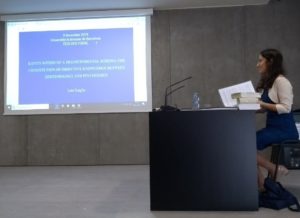El pasado 9 de noviembre de 2018, Lara Scaglia defendió en la Facultad de Filosofía y Letras de la UAB una tesis sobre la noción de esquema transcendental de Kant y la constitución del conocimiento objetivo, entre epistemología y psicología, bajo la dirección de Thomas Sturm. Os dejamos aquí el resumen que nos ha proporcionado la autora.
La presente tesis doctoral pretende entender y evaluar históricamente y críticamente la función del capítulo de Kant sobre el esquematismo transcendental.
He decidido dedicar mi trabajo a la noción del esquema por varias razones. En primer lugar, aunque varios críticos niegan su importancia y sugieren que el esquematismo es un capítulo redundante e innecesario en la Crítica de la Razón Pura, yo creo que lo más conveniente es tratar de descubrir si Kant atribuye una función a este capítulo. En segundo lugar, el problema del esquematismo, o sea la aparente imposibilidad de la aplicación de conceptos puros a las intuiciones, necesita ser clarificado. Si la filosofía de Kant, en sentido crítico, debe aclarar los problemas, el esquematismo es su parte fundamental, pues se ocupa exactamente de la cuestión de como mediar la distinción entre los aspectos intelectual y sensible en la cognición. En tercer lugar, creo que es importante examinar la historia de los términos filosóficos: a menudo los filósofos usan términos que provienen de diferentes campos de la práctica o del saber humano y atribuyen a estos términos nuevos significados acorde a las cuestiones que pretenden resolver, creando, así, un lenguaje técnico. Kant atribuye a ‘esquema’ (término usado con anterioridad sobre todo en la retórica, la lógica y la psicología) un significado determinado, y usa esa noción para indicar que se trata de un método parecido a la construcción en matemática. Finalmente, si la filosofía se considera desde un punto de vista crítico, como una meta-investigación sobre las condiciones de posibilidad de las varias disciplinas, entonces el caso del esquematismo es un ejemplo interesante de las dificultades e importancia de discriminar entre los varios ámbitos del conocimiento: unas interpretaciones tratan el esquematismo como un tema propio de la psicología más que de la filosofía, y Kant mismo usa con soltura una terminología psicológica en el capítulo. Si es así, ¿cuál es la relación entre filosofía y psicología? Seguir leyendo Kant’s notion of a transcendental schema: the constitution of objective knowledge between epistemology and psychology

